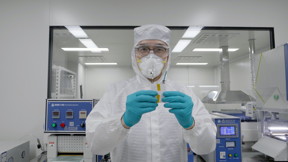Home > Press > Graphene nanotubes gain traction in automotive market: OCSiAl confirms compliance with IATF 16949
 |
Abstract:
OCSiAl has confirmed its graphene nanotube solutions production facility and management system to be compliant with the IATF 16949 standard, paving the way to even wider application of graphene nanotubes in auto industry. Li-ion batteries with increased energy density, light weight, smart car bodies, and safe, energy efficient tires are the drivers for a rapidly growing demand for graphene nanotubes in transportation.
Graphene nanotubes gain traction in automotive market: OCSiAl confirms compliance with IATF 16949
Luxembourg | Posted on March 9th, 2021OCSiAl has passed an audit for compliance with the requirements of IATF 16949, validating its status as a reliable graphene solutions supplier and its quality management system compliance with the auto industry’s strict requirements. The company production sites and management system were already compliant with key industry regulations, including ISO 9001, and have passed clients’ audits. Key points noted during the IATF check were the company’s system for handling clients’ feedback, the raw material and product storage system, the equipment for nanotube solutions for battery production, and the risk assessment system.
“Long, flexible, electrically conductive and strong graphene nanotubes significantly enhance and even grant new properties to literally all materials that are being used in cars. They make it possible to produce safer, lighter, smarter, and more eco-friendly vehicles to facilitate the ongoing fundamental transformation of the auto industry,” said Konstantin Notman, OCSiAl Senior Vice President.
In batteries, graphene nanotubes serve as bridges between silicon particles, creating a robust network inside the anode and protecting it from degradation. Additionally, the use of nanotubes results in an energy density of up to 350 Wh/kg, the possibility of increasing SiO content to 90%, faster charging, and improved safety.
The modification of plastics with graphene nanotubes leads to impressive results in anti-friction and anti-wear coatings, as well as exterior parts painted using the electrostatic painting method. Graphene nanotubes optimize the overall performance of tires, improve abrasion resistance leading to a longer life, bring a strong improvement in wet grip that boosts safety, and allow unrivalled improvement in rolling resistance that reduces vehicles’ energy consumption and emissions.
“To intensify our joint developments with partners in transportation materials engineering, OCSiAl launched its state-of-the-art R&D and technical support center in Luxembourg in September 2020 with the focus on solutions for auto industry,” added Mr. Notman. Other centers of this kind are located in Asia and Eastern Europe.
####
For more information, please click here
Contacts:
Anastasia Zirka
PR & Advertising Manager
+7 913 989 9239
OCSiAl Group
Copyright © OCSiAl Group
If you have a comment, please Contact us.Issuers of news releases, not 7th Wave, Inc. or Nanotechnology Now, are solely responsible for the accuracy of the content.
| Related News Press |
News and information
![]() Simulating magnetization in a Heisenberg quantum spin chain April 5th, 2024
Simulating magnetization in a Heisenberg quantum spin chain April 5th, 2024
![]() NRL charters Navy’s quantum inertial navigation path to reduce drift April 5th, 2024
NRL charters Navy’s quantum inertial navigation path to reduce drift April 5th, 2024
![]() Discovery points path to flash-like memory for storing qubits: Rice find could hasten development of nonvolatile quantum memory April 5th, 2024
Discovery points path to flash-like memory for storing qubits: Rice find could hasten development of nonvolatile quantum memory April 5th, 2024
Graphene/ Graphite
![]() NRL discovers two-dimensional waveguides February 16th, 2024
NRL discovers two-dimensional waveguides February 16th, 2024
Nanotubes/Buckyballs/Fullerenes/Nanorods/Nanostrings
![]() Tests find no free-standing nanotubes released from tire tread wear September 8th, 2023
Tests find no free-standing nanotubes released from tire tread wear September 8th, 2023
![]() Detection of bacteria and viruses with fluorescent nanotubes July 21st, 2023
Detection of bacteria and viruses with fluorescent nanotubes July 21st, 2023
Announcements
![]() NRL charters Navy’s quantum inertial navigation path to reduce drift April 5th, 2024
NRL charters Navy’s quantum inertial navigation path to reduce drift April 5th, 2024
![]() Discovery points path to flash-like memory for storing qubits: Rice find could hasten development of nonvolatile quantum memory April 5th, 2024
Discovery points path to flash-like memory for storing qubits: Rice find could hasten development of nonvolatile quantum memory April 5th, 2024
Automotive/Transportation
![]() Researchers’ approach may protect quantum computers from attacks March 8th, 2024
Researchers’ approach may protect quantum computers from attacks March 8th, 2024
![]() Tests find no free-standing nanotubes released from tire tread wear September 8th, 2023
Tests find no free-standing nanotubes released from tire tread wear September 8th, 2023
|
|
||
|
|
||
| The latest news from around the world, FREE | ||
|
|
||
|
|
||
| Premium Products | ||
|
|
||
|
Only the news you want to read!
Learn More |
||
|
|
||
|
Full-service, expert consulting
Learn More |
||
|
|
||








